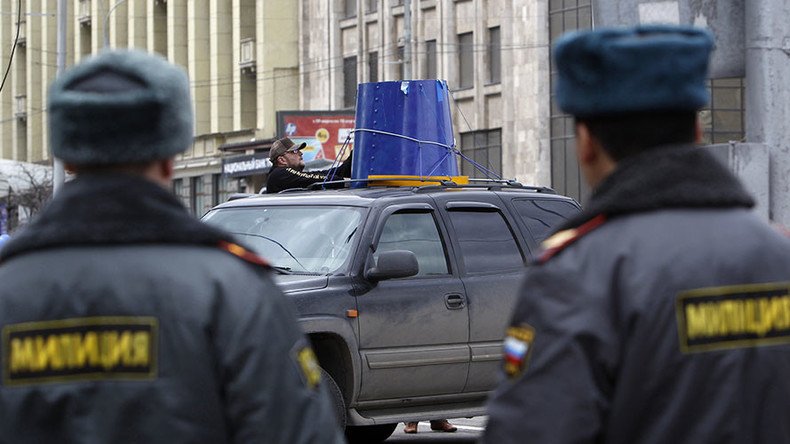End of the road for car protests as Duma gives nod to new bill

The lower house of the Russian parliament has approved a motion that expands the definition of street protests to include car demonstrations and encampments, despite warnings the move could be confusing and lead to potential abuse.
The bill was passed in the first reading by 238 votes to 204 with no abstentions, the RBC news agency reported. The parliamentary majority party United Russia was the only group to support the motion, with all opposition parties voting against it.
The draft was initially drawn up by the government in April last year. If passed, it will allow the Russian law on “Meetings, Rallies, Demonstrations, Marches and Pickets” to cover several new forms of protest, in particular car demonstrations and protest tent camps. Once the bill is passed, protesters would have to follow its requirements and coordinate their actions with local authorities, or face fines of between 300,000 and 1 million roubles (US$3,900 - $13,000).
READ MORE: Police want to broaden law on rallies, cover new forms of protest
Deputy Interior Minister Igor Zubov, one of the sponsors of the draft, told lawmakers it was more of a technical correction necessary for the proper application of an existing law in the changing political climate. According to Zubov, in 2014 tent camp and car protests involving a total of about 4,000 people took place in 27 regions in Russia. In 2015, these new forms of protest were registered in 59 regions and the number of participants increased to 35,000.
Zubov also noted that car protests and encampments were favored by people seeking radical regime change and the overthrow of legally elected officials, including in the cases of the relatively recent events in post-Soviet states such as Ukraine and Moldova.
Opponents of the motion claim it could lead to confusion and even abuse of power. Communist Party MPs noted that many of their comrades decorate their cars with Communist propaganda, and once the bill is passed any trip made in these cars might fall under the definition of a rally. Nationalist-populist party LDPR criticized the bill for targeting the consequences of social tensions instead of their causes.
Car protests became relatively popular in Russia in 2010 as activists and the general public decried the benefits enjoyed by civil servants in city traffic. The protesters put small plastic buckets on their cars to imitate the flashing lights used by privileged drivers, and soon united in a movement called “the Blue Bucket Society.” The protests ended when the government significantly reduced the number of people that could officially use flashing lights and other preferences. However, car-based demonstrations were held for other causes, and were also chosen as a means of protest by the opposition and by the pro-Putin majority.
READ MORE: Government to reduce number of cars with flashing lights
Tent camps and sit-ins are less popular in Russia, probably due to the harsh climate.
Russia introduced the latest version of the Law on Rallies in 2012, raising the fines for violations and requiring the organizers of protests to receive permission from local authorities (with the exception of places specially dedicated for public actions, dubbed by mass media as “Russian Hyde Parks”). The opposition and foreign mass media criticized the new law as “draconian,” but Russian officials, including presidential press secretary Dmitry Peskov, noted in reply that the new rules were actually closer to those applied in most European countries.
READ MORE: Law on illegal rallies similar to Europe’s – presidential spokesman












